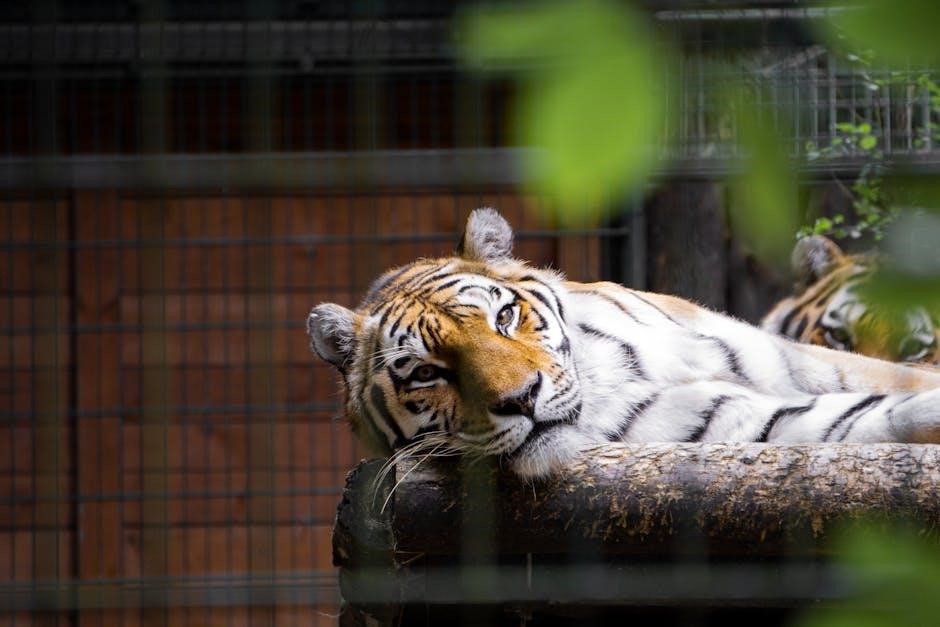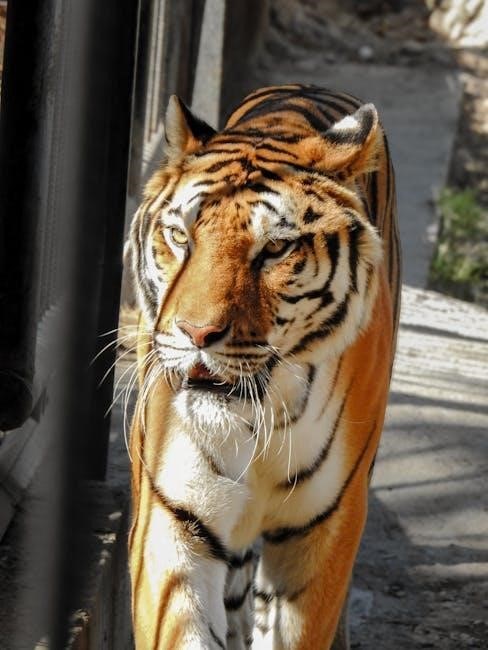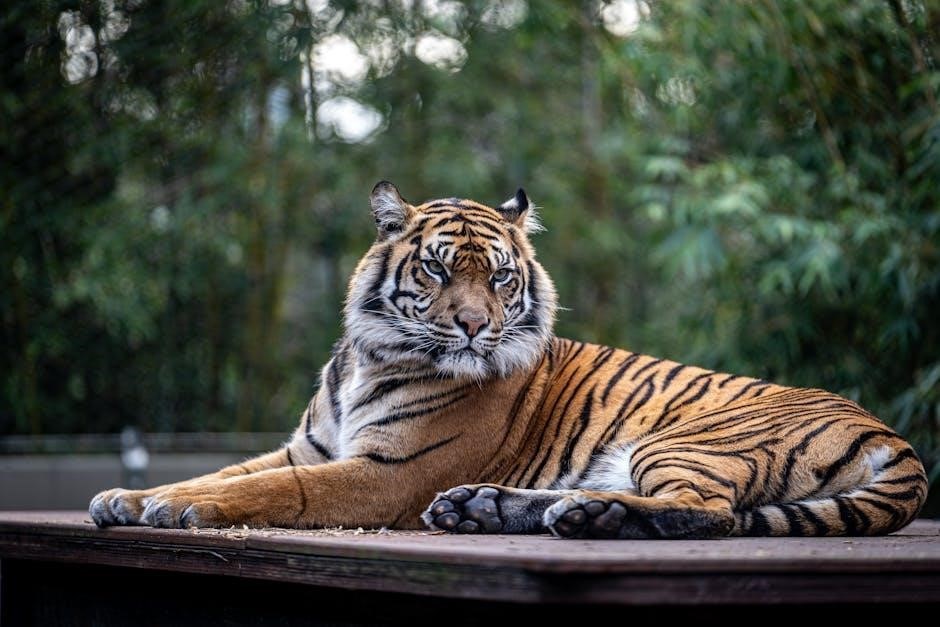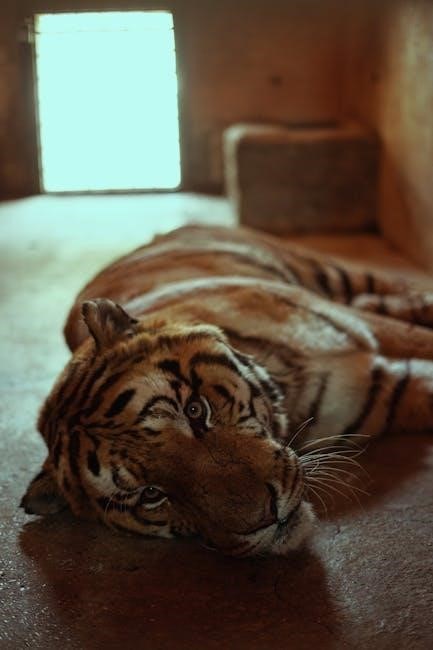bengal tiger at the baghdad zoo pdf
Overview of the Play “Bengal Tiger at the Baghdad Zoo”
Rajiv Joseph’s play‚ set during the Iraq War‚ explores the intersection of war‚ morality‚ and survival through the voice of a Bengal tiger in Baghdad Zoo.
It blends dark humor and existential themes‚ examining the consequences of conflict on both humans and animals‚ with Robin Williams famously portraying the tiger in its Broadway debut.
1.1 Historical Context and Background
Rajiv Joseph’s play is set during the Iraq War‚ exploring the chaos and destruction in Baghdad. The Baghdad Zoo‚ once a symbol of normalcy‚ becomes a casualty of war‚ reflecting the broader devastation. The tiger‚ a central character‚ embodies the plight of endangered species in conflict zones‚ while the play itself offers a unique lens on the human and animal experiences during this tumultuous period.
1.2 Main Themes and Messages

The play explores themes of war’s impact on humanity and nature‚ moral dilemmas‚ and the search for meaning in chaos. It highlights the consequences of conflict on animals and humans‚ while questioning existential truths and the cruelty of war. The tiger’s narrative serves as a metaphor for the destruction of innocence and the enduring quest for justice in a war-torn world.

The Bengal Tiger as a Central Character
The Bengal tiger‚ voiced by Robin Williams in the Broadway production‚ serves as a haunting narrator‚ exploring themes of war‚ morality‚ and survival in a war-torn Baghdad.

2.1 Symbolism of the Tiger in the Play
The Bengal tiger symbolizes the chaos and destruction of war‚ serving as a haunting metaphor for the fallen city of Baghdad. Its presence reflects the moral and philosophical questions raised by the conflict‚ offering a unique perspective on human nature. The tiger’s journey embodies the duality of predator and victim‚ highlighting the futility of war and the universal struggle for survival in a shattered world.
2.2 The Tiger’s Role in the Storyline
The tiger serves as a narrator and moral compass‚ observing the war’s impact on Baghdad Zoo. Its interactions with other characters‚ including soldiers and zookeepers‚ reveal the psychological toll of conflict. The tiger’s commentary on human behavior and its own existential struggles weave together themes of survival‚ guilt‚ and redemption‚ making it a central figure in the play’s exploration of war’s consequences.
The Baghdad Zoo Setting
The Baghdad Zoo serves as a central setting‚ reflecting the chaos and destruction of war. It becomes a microcosm of the city’s turmoil‚ highlighting the impact of conflict on wildlife and humanity.
3.1 Description of the Zoo in the Play
The Baghdad Zoo is depicted as a place of chaos and destruction‚ reflecting the city’s turmoil. Empty cages and damaged structures symbolize the war’s devastating impact on wildlife. The tiger’s presence highlights the zoo’s role as a refuge and a microcosm of the city’s suffering‚ blending reality and metaphor to convey the brutality of conflict.
3.2 The Zoo as a Metaphor for War-Torn Baghdad
The zoo serves as a powerful metaphor for Baghdad’s devastation during the Iraq War. Its crumbling infrastructure and abandoned cages mirror the city’s chaos and destruction. The tiger’s presence amidst the rubble symbolizes the resilience and trapped existence of both animals and humans in a war-torn environment‚ reflecting the broader societal breakdown and moral decay caused by conflict.

Key Themes and Motifs
Central themes include the impact of war on animals and humans‚ moral dilemmas‚ and survival instincts. Motifs explore existential questions and societal decay amid conflict.
4.1 The Impact of War on Animals and Humans
The play vividly portrays how war devastates both humans and animals‚ highlighting their shared vulnerability. The Bengal tiger‚ once a zoo inhabitant‚ now navigates the chaos of Baghdad‚ symbolizing the loss of innocence and habitat. Similarly‚ human characters face moral decay and existential crises‚ illustrating the universal suffering caused by conflict.
4.2 Moral and Ethical Dilemmas in Conflict Zones
The play delves into the moral ambiguity of war‚ where characters face tough ethical choices; The tiger‚ questioning its existence‚ reflects on primal instincts versus moral consciousness. Soldiers and locals alike grapple with survival‚ loyalty‚ and justice‚ exposing the complexity of human behavior in conflict zones. These dilemmas underscore the play’s exploration of right and wrong amidst chaos.
The Role of Robin Williams in the Broadway Production
Robin Williams starred as the Bengal Tiger‚ bringing depth and nuance to the character. His performance highlighted the play’s emotional core and its critique of war.
5.1 Robin Williams’ Performance as the Tiger
Robin Williams delivered a captivating performance as the Bengal Tiger‚ blending humor and pathos to bring the character to life. His portrayal added depth to the narrative‚ exploring themes of morality and existentialism. Williams’ ability to convey the tiger’s introspective nature and its commentary on human actions was praised‚ making his role a memorable highlight of the production.

5.2 The Significance of His Involvement
Robin Williams’ involvement in Bengal Tiger at the Baghdad Zoo brought significant attention to the play‚ leveraging his star power to highlight its thought-provoking themes. His portrayal of the tiger added emotional depth and complexity‚ drawing audiences to the production. Williams’ participation not only elevated the play’s cultural relevance but also underscored its exploration of war‚ morality‚ and existentialism‚ making it a memorable and impactful theatrical experience.

Cultural and Artistic Reception
The play received critical acclaim for its dark humor and existential themes‚ with Robin Williams’ performance highlighting its cultural impact and contribution to understanding the Iraq War.

6.1 Critical Reviews and Audience Responses
The play received mixed reviews‚ with critics praising its bold narrative and dark humor. Robin Williams’ performance as the tiger was widely acclaimed‚ bringing depth to the production. Audiences found the play thought-provoking‚ though some struggled with its unsettling themes. The mix of comedy and tragedy resonated with many‚ while others felt it lacked emotional resolution. Overall‚ it sparked significant discussion about war’s impact and moral dilemmas.
6.2 The Play’s Contribution to War Literature
Rajiv Joseph’s play adds a unique perspective to war literature by blending dark humor with poignant reflections on human nature. Its use of the tiger as a narrator offers a fresh lens to explore the Iraq War’s complexities. The play humanizes the conflict‚ emphasizing the shared suffering of both soldiers and animals. It challenges traditional narratives‚ enriching the genre with its innovative storytelling and moral questioning‚ making it a significant work in contemporary war literature.

The PDF Version and Its Availability
The PDF version of Bengal Tiger at the Baghdad Zoo is widely available for download on platforms like Google Drive‚ Scribd‚ and academic databases‚ with over 2‚360 views and 276 downloads recorded‚ making it easily accessible for readers worldwide.
7.1 Sources for Downloading the PDF
The PDF version of Bengal Tiger at the Baghdad Zoo can be downloaded from platforms like Google Drive‚ Scribd‚ and academic databases. Uploaded by users such as Josh Warner‚ it has garnered 2‚360 views and 276 downloads‚ with a file size of 5MB. Additionally‚ websites offering free eBooks and educational resources provide access to this play‚ ensuring its availability for research and reading purposes globally.
7.2 Legal and Ethical Considerations for Distribution
Distribution of Bengal Tiger at the Baghdad Zoo in PDF format requires proper authorization. Performance rights must be obtained‚ and the author‚ Rajiv Joseph‚ must receive full credit. Unauthorized sharing or production is prohibited and may lead to legal action. Ethical considerations include respecting copyright laws and ensuring royalties are paid to the playwright or authorized parties. Legal compliance is essential to avoid infringement and support the creator’s rights.
Educational and Research Value
This play serves as a valuable educational tool for studying the Iraq War’s impact on humanity and wildlife‚ offering deep insights for researchers and students alike.
8.1 The Play as a Tool for Studying the Iraq War
Bengal Tiger at the Baghdad Zoo offers a unique perspective on the Iraq War‚ blending dark humor with poignant reflections on humanity and morality. Its portrayal of life in war-torn Baghdad‚ through the lens of the zoo and its inhabitants‚ provides a compelling narrative for educators and researchers. The play examines the psychological and emotional toll of conflict‚ making it a powerful tool for understanding the complexities of war and its impact on both humans and animals.
8.2 Its Relevance to Conservation and Wildlife Discussions
The play highlights the plight of endangered species‚ like the Bengal tiger‚ in conflict zones‚ emphasizing the fragility of wildlife during war. By portraying the zoo’s deterioration‚ it underscores the broader impact of human conflict on ecosystems. This narrative serves as a powerful tool for discussing conservation challenges and the need for protecting wildlife in war-torn regions‚ resonating with contemporary environmental and ethical debates.

The Play’s Connection to Real-World Events
The play reflects the chaos of war-torn Baghdad‚ mirroring real-world events during the Iraq War‚ where zoos became casualties and animals suffered alongside humans in conflict zones.
9.1 The Plight of Endangered Species in Conflict Zones
The play highlights the devastating impact of war on endangered species‚ such as the Bengal tiger‚ emphasizing their vulnerability in conflict zones. The Baghdad Zoo‚ once a sanctuary‚ becomes a casualty of war‚ mirroring real-world scenarios where animals suffer alongside humans.
Neglect‚ habitat destruction‚ and the collapse of conservation efforts underscore the tragic fate of wildlife in war-torn regions‚ raising urgent calls for global action and awareness to protect these vulnerable creatures.
9.2 The Historical Accuracy of the Play’s Depiction of Baghdad
Rajiv Joseph’s play captures the chaos and destruction of Baghdad during the Iraq War‚ reflecting the city’s real-life turmoil. The portrayal of the Baghdad Zoo mirrors historical accounts of its neglect and devastation‚ offering a stark glimpse into the war’s impact on both humans and animals.
The play’s setting‚ though fictionalized‚ aligns with the harsh realities of the time‚ blending dark humor with the brutality of war to create a poignant commentary on the era’s historical events.
The play “Bengal Tiger at the Baghdad Zoo” leaves a lasting impact‚ offering a poignant reflection on war‚ morality‚ and survival. Its themes resonate universally‚ fostering dialogue on conflict’s consequences and the need for preservation of such stories to understand the complexities of war and its aftermath.
10.1 The Lasting Impact of the Play
Bengal Tiger at the Baghdad Zoo remains a powerful exploration of war’s consequences‚ resonating with audiences through its blend of dark humor and existential reflection. Robin Williams’ iconic portrayal of the tiger in the Broadway production elevated its visibility‚ while its themes of survival and morality continue to provoke thought. The play’s accessibility as a PDF ensures its educational value‚ making it a vital resource for understanding the complexities of conflict and its aftermath;
10.2 The Importance of Preserving Such Stories
Preserving Bengal Tiger at the Baghdad Zoo is crucial for its cultural and educational value‚ offering insights into the Iraq War’s complexities. Its availability as a PDF ensures accessibility for future generations‚ fostering dialogue on war’s impact. The play’s unique narrative‚ blending humor and existential themes‚ provides a poignant reflection on humanity and morality‚ making it a vital piece of contemporary war literature.
